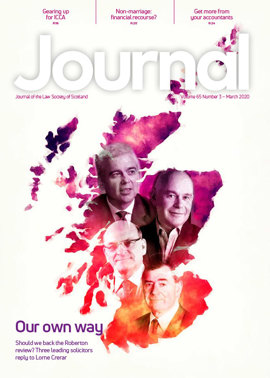Shining a light on arbitration

Scotland at the centre of the world of arbitration. It’s not something the country is used to, but it’s happening this spring. The International Council for Commercial Arbitration (ICCA) has chosen Edinburgh for its 25th biennial Congress, and from 10-13 May about 1,000 people from across the globe will gather in the capital to discuss the future shape of their field.
Their Scottish hosts, naturally, hope that the event will provide a major boost to the use of arbitration in this jurisdiction. As a private form of dispute resolution, the extent to which it is already practised in Scotland has been a matter of some doubt. Is it already significant? And is it worth looking at as a career path for lawyers?
Someone who believes the answer to both these questions is “yes”, is Lindy Patterson QC, one of the first Scottish solicitor advocates and now an English barrister operating as an international arbitrator, who is on the programme committee for this year’s Congress.
Patterson has seen the popularity of arbitration fluctuate since the mid 1980s when, as a commercial litigator, she began to specialise in construction disputes. At that time arbitration was the way disputes were resolved, but for a combination of reasons it fell out of favour during the 1990s: the rules were outdated and the Court of Session appeal procedure cumbersome and expensive; the newly instituted Commercial Court provided a speedier remedy; and in the world of construction the creation of the fast track adjudication process proved effective to resolve most disputes. Like many of her colleagues, Patterson got into that medium instead.
The international scene
She became involved in the international scene around 15 years ago with dispute boards, another international dispute avoidance mechanism: “You are appointed at the beginning of a contract to deal with any disputes that arise, so you’re the first port of call – you are just there if you’re needed.
“I was appointed in about 2005 to chair a dispute board in a large nuclear power project in Finland, the first one I had ever done. That was really interesting; I was on that board for about five years and involved in a very large referral of a dispute which thankfully ended satisfactorily, because you can then go to arbitration if you’re dissatisfied but parties didn’t do so.
“I’ve had that sort of dual thing since then: I’ve generally had one or two dispute boards running, and also became President of an international federation that promotes dispute boards.”
As an aside, it sounds like just the sort of mechanism that could have smoothed the progress of the Edinburgh trams project; Patterson tells me that Scotland has since seen the concept put in place during the construction of the Queensferry Crossing, and it appears to have worked. “So there’s lots happening on the dispute avoidance front, but at the same time there’s lots happening in international arbitration.”
She became involved in the latter, the more so after her firm, Dundas & Wilson, combined with CMS, “and sort of picked up where I had left off. That led me to operating as an arbitrator and that has really been my main job since I left CMS”.
That was almost three years ago, after she discovered the difficulty of working as an arbitrator from within a law firm. “The conflicts are enormous, especially if you’re in a law firm that has offices all over the world, and also the law firm model is not set up to accommodate people acting as arbitrator full time, because it’s just you, it’s not you and a team. I decided I’d reached a stage where I wanted to pursue that full time.”
Now based for much of the time in London, Patterson has found herself in demand. The fact that the rules differ somewhat from seat to seat is no great barrier to being asked to act in different parts of the world, provided you understand the practice of the particular region. “For example I do a lot in the Middle East, so having an understanding of the local arbitration laws there which supplement any rules is important. I also do quite a bit in Scandinavia, and I’ve just been appointed to one in the Caribbean, which sounds very glamorous – whether it will be or not, I’m not sure!
“But the important thing is to recognise that you need to get to grips with the local arbitration law. You will get submissions from parties or hear experts on the governing laws of the underlying contracts.”
As in other fields, a Scottish training carries some weight. “It seems to be generally accepted, and one of the selling points as well, that if you have a Scottish qualification you are not so embedded in the common law system, because there is in some countries a bit of an antipathy towards the common lawyer. As our system is a bit of a mix, that can help.”
Scottish practice
Patterson does still act in some domestic Scottish arbitrations. So, returning to our other opening question, how popular is it really? “I get the impression it is used far more than people realise,” she replies. “It is certainly very well used in property disputes of all types, landlord and tenant, anything related to leases. It’s also used in IT contracts and general commercial contract disputes, so I think there is quite a bit of it about. And what’s interesting for me is that there is a developing expertise amongst the lawyers who appear in front of me.”
In other words, it is regularly used in most fields, except construction, where adjudication predominates. Although that is only intended as an interim mechanism, Patterson estimates that about 97% of adjudication decisions are not taken further. “There are some construction arbitrations around, but not so many. And that’s the same across the UK. Which is probably why so many London lawyers have developed their international arbitration practice.”
Since the 2010 Arbitration (Scotland) Act modernised the law, Patterson believes the Scottish legislative framework is now as good as any. The Scottish Arbitration Centre also has evidence of increased interest in arbitration. Whether its ambition to attract cases from abroad will be fulfilled may depend on the legacy of events such as ICCA. “It is competing in a busy marketplace with a number of arbitration centres and institutions, so it is all about carving out its own unique role.”
What does she herself enjoy about acting as arbitrator? “It’s completely varied, and there are so many issues that arise, in the context of procedure, applications for interim measures, very detailed complex disputes, that it’s as much about effectively managing the arbitration as it is about the ultimate decisions. But both are really important.”
How would she advise lawyers interested in developing their career in this way? “I would definitely go for it. If being involved in dispute resolution is something you’re interested in, arbitration is an excellent tool to be involved in and to promote. I think there are opportunities across the board; it depends which areas you specialise in, whether they lend themselves to arbitration, but I have seen arbitration in so many disciplines.”
ICCA attractions
And so to ICCA. Is it the hope that the Congress will have a longer term impact in Scotland?
“Yes. I think it has already increased awareness locally about arbitration, and it’s put Scotland on the map as far as the Scottish Arbitration Centre is concerned, so I do think it will. Quite to what extent is hard to say; obviously the more engagement people have the better, and although it’s hard to work out what these events really mean for you and your practice, I’ve said to many people that with ICCA there’s a whole range of possibilities. One of them is that you’re mixing with lawyers from so many other jurisdictions; that’s got to be useful.
“But also some of the subjects. The panel I’m chairing is called the Dispute Resolution Toolbox, which sounds a bit clichéd but we have contributors from Kenya, the United States, Canada and South America, and the insights on different ways of resolving disputes are going to be amazing. Getting these sort of angles will be really interesting for anybody who’s involved in that kind of work.”
Any speaker at the Congress has to produce a paper in advance. “It’s not just pitching up. And papers are all vetted; it’s a big thing. I’m quite glad I’m chairing and not speaking!”
In addition to Kirsty Wark as MC, Scots with speaking roles include Sir David Edward, Lord Hodge, Alison MacDonald QC, Brandon Malone, Janey Milligan and Nesreen Osman, with Lord Carloway delivering the closing address. The Congress theme, “Arbitration’s Age of Enlightenment?”, recognises, Patterson explains, “that we’ve come a long way in arbitration but it is looking at what more can be done, which is why we’re discussing different forms of ADR in the context of arbitration”.
The big, somewhat controversial, thing at present is MedArb – combined mediation and arbitration. “I’ve got to say that, like many other UK lawyers, I was suspicious of this idea that an arbitrator could become a mediator at one point and then go back again to arbitrating, but the Singapore rules have now included this possibility, and it’s generally well-accepted in the East, just not so in the West – the UK or the US. So we’re going to have a discussion about that and quite how it will work, but there’s a view that the tide is moving that way and it’s appropriate to look at it with a more open mind than perhaps common lawyers have in the past.”
Who should consider going to the Congress, and how much of a specialist do you need to be?
“I don’t think you have to be a specialist. There are two aspects. One is hearing the subject matter, and there will always be topics you’re interested in. The other is the opportunity to network, which will be enormous. It is shaping up to be the biggest ICCA to date.
“There are so many opportunities to hear formally and informally of others’ experiences and aspirations in the dispute resolution field. That’s got to be worth it for anyone’s practice.”
For registration details, including local practitioner rates, see icca2020.scot/register






